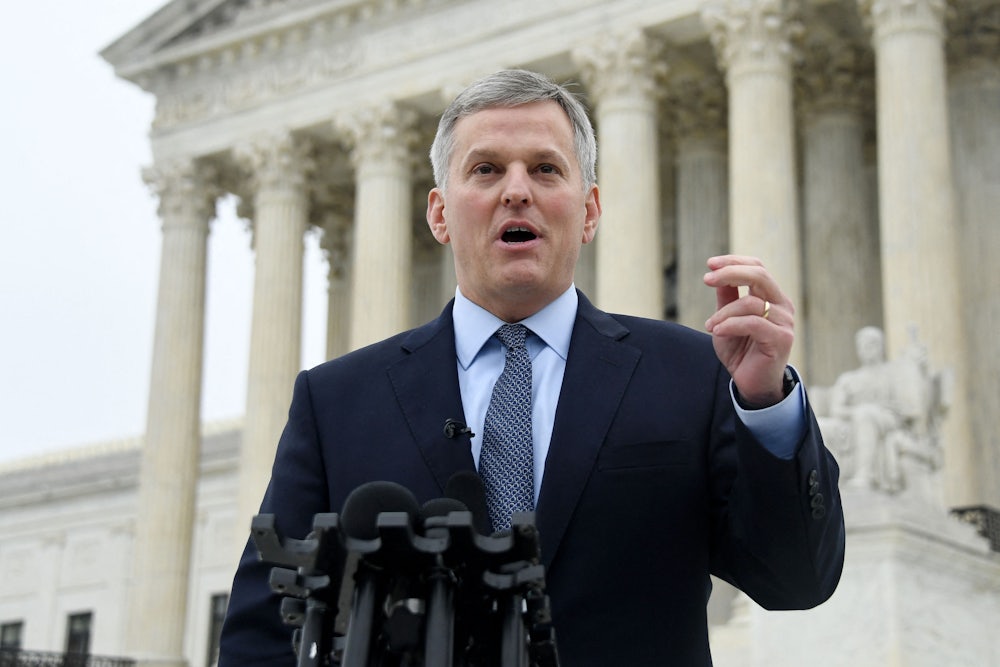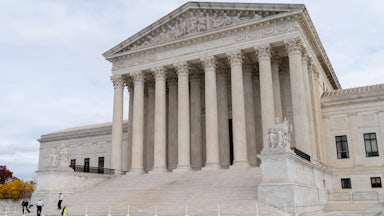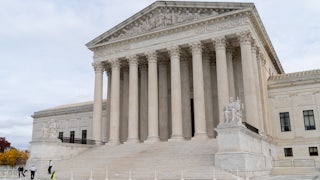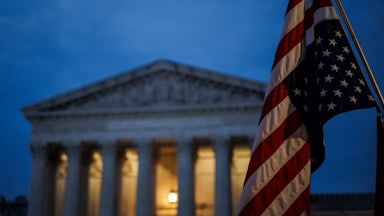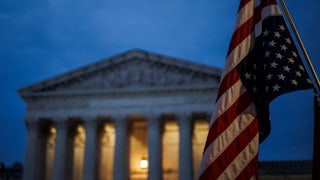The Supreme Court’s conservative majority appeared divided on whether to embrace a once fringe legal theory on state election laws during oral arguments in Moore v. Harper on Wednesday. The case, which is one of the most closely watched disputes of the current term, could upend how states craft and interpret their election laws. Critics of the independent state legislature theory have warned that it could have dire consequences for the integrity of American democracy.
Those concerns were echoed not only by the lawyers arguing before the court on Wednesday but by some of the justices themselves. “This is a theory with big consequences,” Justice Elena Kagan remarked at one point. “It gets rid of the normal checks and balances on the way big governmental decisions are made in this country. You might think it gets rid of all those checks and balances at exactly the time they are needed most.”
Moore v. Harper’s origins trace back to a lawsuit brought by voting rights groups to challenge the state’s congressional maps after the 2020 census. They alleged that the maps, which were drawn by the state’s Republican-controlled legislature, amounted to an illegal partisan gerrymander in the GOP’s favor. Federal courts can no longer hear partisan-gerrymandering cases after the Supreme Court’s ruling in Rucho v. Common Cause in 2019. But state courts retained the power to hear challenges along those lines under their state constitutions.
The North Carolina Supreme Court ruled in the groups’ favor last year based on a provision in the state constitution that guarantees “free” elections. When the case returned to a state district court, it ordered new maps to be drawn by court-appointed experts for use in the 2022 midterms. Republican lawmakers asked the Supreme Court to intervene earlier this year, arguing that the state supreme court’s intervention had violated the Elections Clause of the federal Constitution.
That clause says that the “times, places, and manner” of House and Senate elections “shall be prescribed in each state by the legislature thereof.” (A similar clause applies to presidential elections, but we’ll come back to that later.) For the last two and a half centuries, state legislatures and state courts generally thought that the Elections Clause meant that election laws would be drafted and passed by state legislatures, signed into law by governors, and interpreted by state courts. North Carolina Republicans, however, contend that the clause actually means that when state legislatures pass election laws, they’re drafting some kind of superlaw that can’t be limited by state constitutions or state courts.
The implications of this “independent state legislature” theory, in its most maximalist version, would be sweeping. Federal courts would retain the power to review state election laws if they violate the federal constitution, but state courts would be powerless to apply the state constitution to an entire swath of state laws. And if the state constitution doesn’t apply, then voters themselves have fewer options to check a state legislature’s power when drafting those laws. This could have significant consequences for state-level efforts to address gerrymandering and voter suppression through ballot initiatives and amendments. If applied to presidential races, some opponents of the theory have argued, it could destabilize the peaceful transition of power by opening up new avenues for legislative malfeasance.
The Supreme Court has never issued a ruling that embraces the independent state legislature theory. More than a few, in fact, cut against it. Most of the court’s conservative justices, however, have expressed a willingness to embrace the theory in some form. Chief Justice John Roberts and Justices Clarence Thomas and Samuel Alito argued in a 2015 dissent that transferring the redistricting power from state legislatures to independent commissions violates the Elections Clause. Justices Neil Gorsuch and Brett Kavanaugh expressed interest in applying the theory in recent election-related cases on the shadow docket. Justice Amy Coney Barrett, the court’s second-newest member, hasn’t yet addressed it in her judicial career.
At oral arguments on Wednesday, Barrett appeared deeply skeptical of the North Carolina Republicans’ approach to the independent state legislature theory, especially when it came to practical applications for the courts. At one point, the justices questioned David Thompson, who argued on behalf of the state lawmakers, about a 1932 case where the Supreme Court held that a governor’s veto didn’t violate the Elections Clause, which runs counter to the theory’s reading of that clause. Thompson tried to dismiss the gubernatorial veto as a mere procedural hurdle, which did not appear to persuade Barrett.
The court’s three liberal justices were unsurprisingly hostile toward the theory. Justice Elena Kagan said that its adoption could allow state legislatures to “insert themselves” in the tabulation and certification of election results. That appeared to be an implicit reference to former President Donald Trump and his efforts to overturn the 2020 presidential election, and the U.S. Constitution has a clause with similar language for presidential races. Justice Ketanji Brown Jackson emphasized that state legislatures are constructs of state constitutions and can’t be cleanly separated from them. Justice Sonia Sotomayor appeared disdainful toward the state lawmakers’ case itself. “It seems that every answer you give is to give you what you want,” she told Thompson at one point when questioning him about historical counterexamples.
But even some of the conservative justices appeared uneasy with the theory as articulated by the state lawmakers. Kavanaugh remarked at one point that their version “seems to go further than Rehnquist in Bush v. Gore,” referring to a concurring opinion by then–Chief Justice William Rehnquist during the 2000 election dispute. As a concurring opinion, Rehnquist’s opinion is not binding precedent on the courts, but it has served as a touchstone of legitimacy for the theory over the last two decades. Kavanaugh is unusually familiar with that case because he worked on George W. Bush’s legal team at the time. So did Roberts, whose questions focused on narrower ways to resolve the case and may have signaled unease with the maximalist approach.
Oral arguments can be an imperfect road map for how the justices will ultimately decide a case once they deliberate about it behind closed doors. The independent state legislature theory still had its apparent supporters, with Alito and Gorsuch pointedly questioning the three lawyers who argued against its adoption. At minimum, however, a majority of justices appeared uneasy with giving an all-out victory to the North Carolina Republican lawmakers who brought them the case. What sort of compromise they reach—or whether they reach one at all—won’t be known until the final decision is released sometime over the next six months.
